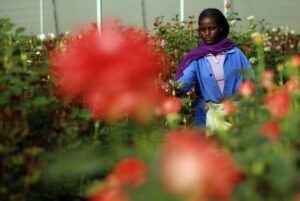Below is text from a Background Paper published by the German Network Africa which is affiliated to the Africa Europe Faith and Justice Network (AEFJN). This short but interesting piece is full of information and highlights the pros and cons of the flower industry in Africa.
Fresh flowers are a billion-dollar business in which Africa has secured a significant place. For Kenya in particular, the export of flowers has become an important economic factor. Where do the African flowers in our markets come from?
A GROWING INDUSTRY: Great biodiversity and good climatic conditions favour a successful flower industry in several African countries, which has seen strong growth in recent years. Despite strong competition on the international markets from Latin American and Asian countries, Africa has been able to gain further market shares. This is due to the high quality of African products, cheap labour, and geographical proximity to European markets.
The export of flowers has made a significant contribution to economic growth in some countries and has created many new jobs in the cultivation and harvesting, sorting, packing and dispatch of flowers. This benefits local communities, who use the income to build schools and health centres and to improve infrastructure. Many companies not only invest in the training of workers on their own flower farms, but also help local farmers in the surrounding villages to produce independently. To this end, they offer them programmes to produce more sustainably and become more efficient in the packaging and quality of their products.
Women, who make up a significant proportion of the labour force, have benefited the most. Some companies have an explicit policy of promoting women and empowering them to succeed in senior positions. They thus make an important contribution to gender equality.

Flowers are not just an economic factor. They contribute to people’s quality of life and are a source of joy and well-being for millions of people. Flowers also have a therapeutic effect and therefore have a firm place in hospitals, rehabilitation centres and wellness programmes.
SUSTAINABILITY: Critical voices accuse the African flower industry of not being sustainable. This is not true for most companies, which have good reasons to organise their production sustainably. They try to minimise the use of chemicals and instead rely on natural methods in order to preserve beneficial insects and biodiversity. The energy requirements of greenhouses are also increasingly being generated by solar systems.
Sophisticated irrigation systems also minimize water consumption. Sustainable production is subject to defined standards and is monitored and certified by independent organisations.
THE MOST SUCCESSFUL COUNTRIES: Countries that have profited most are –
Kenya: The country has become one of the leading exporters of fresh flowers. This has created economic growth and new jobs. 2024 Kenya exported a dozen different kinds of flowers into 60 different countries worth 1.09 billion US-Dollars which make up about a third of all the foreign currency earnings of the country. Experts expect a yearly growth of about 5%. Most of the flowers go to the Netherlands, Great-Britain, Germany and Norway.
Ethiopia: With some 85 flower plantations is Ethiopia the No. 2. The local climate favours especially the cultivation of roses. Ethiopia is only seven hours flight from Europe. The modern airport of Addis Ababa and an interrupted chain of refrigeration facilities ensure an efficient export.
Tanzania and Uganda, too, have a growing number of plantations to produce flowers for export.
NEGATIVE EFFECTS: The world-wide boom of the flowers industry has also some negative side effects. The flower culture in green house demand great quantities of water. In regions that have little rainfall this could endanger the water supply for the local population. There is also the danger that the soil and water systems are contaminated by pesticides. Many countries have a high degree of unemployment. Workers can easily be  exploited by paying them unfair salaries. Governments are sometimes criticized for favouring plantations for the production of export goods at the expense of the production of the basic food for the local population. Africa’s flower industry is likely to get more competition from the flower industries in Asia and Latin America, where flowers are exported more cheaply by ship in refrigerated containers.
exploited by paying them unfair salaries. Governments are sometimes criticized for favouring plantations for the production of export goods at the expense of the production of the basic food for the local population. Africa’s flower industry is likely to get more competition from the flower industries in Asia and Latin America, where flowers are exported more cheaply by ship in refrigerated containers.
Source: background paper published by Netwerk Afrika Deutschland, April 2024

